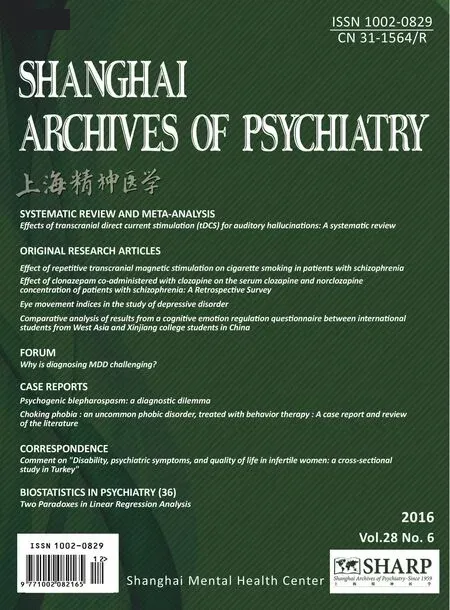Comment on "Disability, psychiatric symptoms, and quality of life in infertile women: a cross-sectional study in Turkey"
Salvatore Giovanni Vitale , Valentina Lucia La Rosa* , Agnese Maria Chiara Rapisarda,Antonio Simone Laganà
•Correspondence•
Comment on "Disability, psychiatric symptoms, and quality of life in infertile women: a cross-sectional study in Turkey"
Salvatore Giovanni Vitale1, Valentina Lucia La Rosa2* , Agnese Maria Chiara Rapisarda3,Antonio Simone Laganà1
infertility; disability; quality of life
Dear Editor,
We read with great interest the article by Sezgin and colleagues[1]about psychiatric symptoms, disability and quality of life in fertile and infertile women in Turkey.We agree that infertility is a very stressful experience for women and it can also be influenced by socio-cultural factors. For this reason, it is important to investigate the role of these factors in order to better understand the effects of infertility both in women and couples.
Although we appreciated the methodology used by the authors, we take the opportunity to point out several elements which would let us further realize the results of this study.
First of all, the authors could have used a larger sample in order to increase the validity of their data analysis. Moreover, the study enrolled women who had a diagnosis of infertility but authors did not specify the type of infertility nor the cause (primary infertility,male factor infertility/female factor infertility or both,unexplained infertility). Indeed, many studies about this topic have underlined that the causes of infertility have a different impact on emotional and psychological wellbeing of women affected.[2,3]So, we think that authors should have considered this element in their study.
Also, it is not clear what the type of infertility treatment discussed in the study is and if enrolled women are on their first attempt at treatment or not. Literature underlines that the different types of assisted reproductive techniques (ARTs) differently affect the emotional state of both women and couples.In addition, the failure of treatment may inf l uence the quality of life and the relationship within the couple so it is important to consider this variable as well .[4]
We would like to know if women with a history of anxiety and depression or with organic pathologies that may affect psychological well-being were excluded from the sample. If these women were not excluded, it would not be possible to conclude that the results registered among the women of this study were related to their infertility condition rather than to other pathologies.
As regards the tests used by the authors, the results are based on the use of self-report psychometric measures. According to our opinion, it is important to consider that these results may have been inf l uenced by a series of individual factors which may limit the validity of self-evaluation instruments. Moreover, it would be interesting to use a test more specific to people suffering from infertility such as the Fertility Quality of Life questionnaire (FertiQoL)[5].
Finally, it is important to investigate the consequences of infertility for the partners of the affected women. Indeed, many studies have demonstrated that the experience of infertility may affect sexual function, partner relational satisfaction and general well-being within the couple.[2]
In conclusion, based on these data and our experience, we strongly suggest that future studies use larger samples, consider the influence of factors such as cause of infertility and assisted reproductive techniques (ARTs) and, last but not least, exclude other comorbidities which may inf l uence the data analysis.
Conflict of interest
The authors report no conflict of interest related to this manuscript.
Funding support
No funding was provided to prepare this manuscript.
Authors’ contribution
Agnese Maria Chiara Rapisarda collected the available data from the literature; Valentina Lucia La Rosa wrote the draft of the Manuscript; Antonio Simone Laganà revised the Manuscript; Salvatore Giovanni Vitale provided insightful comments, supervised the development of the Manuscript and gave the final approval.
1. Sezgin H, Hocaoglu C, Guvendag-Guven ES. Disability,psychiatric symptoms, and quality of life in infertile women:a cross-sectional study in Turkey. Shanghai Arch Psychiatry.2016; 28(2): 86-94. doi: http://dx.doi.org/10.11919/j.issn.1002-0829.216014
2. El Kissi Y, Romdhane AB, Hidar S, Bannour S, Ayoubi Idrissi K,Khairi H, et al. General psychopathology, anxiety, depression and self-esteem in couples undergoing infertility treatment:a comparative study between men and women. Eur J Obstet Gynecol Reprod Biol. 2013; 167(2): 185-189. doi: http://dx.doi.org/10.1016/j.ejogrb.2012.12.014
3. Laganà AS, Vitale SG, Iaconianni P, Gatti S, Padula F. Male Infertility during Antihypertensive Therapy: Are We Addressing Correctly The Problem? Int J Fertil Steril. 2016;10(3): 267-269
4. Muscatello MR, Lorusso S, Bruno A, Reale R, Ciura GL, Laganà AS, et al. Anger in women treated with assisted reproductive technology (ART): effects on mother and newborn. J Matern Fetal Neonatal Med. 2016; 29(5): 813-817
5. Boivin J, Takefman J, Braverman A. The fertility quality of life (FertiQoL) tool: development and general psychometric properties. Hum Reprod. 2011; 26(8): 2084-2091. doi: http://dx.doi.org/10.1093/humrep/der171

Dr. Salvatore Giovanni Vitale obtained a medical degree in 2009 from University of Catania, Italy,and he specialized in Obstetrics and Gynecology in 2015 at University of Catania, Italy. He currently conducts his research activity in the Department of Human Pathology in Adulthood and Childhood“G. Barresi” at University of Messina, Italy. He is also the author of numerous scientificpapers. His research interests are infertility, gynaecological and endoscopic surgery and prenatal diagnostics.
对《不孕妇女的功能障碍、精神病症状和生活质量:一项来自土耳其横断面研究》一文的述评
Vitale SG, La Rosa VL, Rapisarda AMC, Laganà AS
不孕症;功能障碍;生活质量
The aim of this work is to comment on the study about disability, psychiatric symptoms and quality of life in infertile women of Turkey that was published in this Journal. We suggest that future studies use larger samples, consider the influence of factors such as cause of infertility and assisted reproductive techniques (ARTs) and, last but not least, exclude other comorbidities which may inf l uence the data analysis.
[Shanghai Arch Psychiatry. 2016; 28(6): 353-354.
http://dx.doi.org/10.11919j.issn.1002-0829.216083]
1Unit of Gynecology and Obstetrics, Department of Human Pathology in Adulthood and Childhood “G. Barresi”, University of Messina, Via Consolare Valeria 1, 98125 Messina, Italy.
2Unit of Psychodiagnostics and Clinical Psychology, University of Catania, Via Santa Sof i a 78, 95124, Catania, Italy.
3Department of General Surgery and Medical Surgical Specialties, University of Catania, Via Santa Sof i a 78, 95124, Catania, Italy.
*correspondence: Valentina Lucia La Rosa. Mailing address: Via S. Sof i a 78, Catania 95124, Italy. E-Mail: psicolarosa@gmail.com
概述:本文旨在对在本刊刊登的有关土耳其不孕症妇女的功能障碍、精神症状和生活质量的研究发表一些见解。我们提议将来的研究应使用较大的样本,同时要考虑诸如导致不孕症的病因以及辅助生育技术(ARTs)等影响因素,最后也是很重要的一点,就是要排除可能影响数据分析的其他共病情况。
- 上海精神医学的其它文章
- Two Paradoxes in Linear Regression Analysis
- Choking phobia : an uncommon phobic disorder, treated with behavior therapy : A case report and review of the literature
- Psychogenic blepharospasm: a diagnostic dilemma
- Why is diagnosing MDD challenging?
- Comparative analysis of results from a cognitive emotion regulation questionnaire between international students from West Asia and Xinjiang college students in China
- Eye movement indices in the study of depressive disorder

